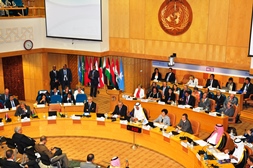 3 October 2016, Cairo – Ministers of health and high-level representatives of the 22 countries and territories of WHO’s Eastern Mediterranean Region and health partners are attending the 63rd session of the Regional Committee meeting in Cairo, Egypt. The Regional Committee for the Eastern Mediterranean is WHO’s decision-making body in the Region. It meets in October each year to formulate regional policies to protect public health and respond to common public health threats.
3 October 2016, Cairo – Ministers of health and high-level representatives of the 22 countries and territories of WHO’s Eastern Mediterranean Region and health partners are attending the 63rd session of the Regional Committee meeting in Cairo, Egypt. The Regional Committee for the Eastern Mediterranean is WHO’s decision-making body in the Region. It meets in October each year to formulate regional policies to protect public health and respond to common public health threats.
H.E. the Minister of Health of Kuwait Dr Ali Saad Al-Obeidi, the chairman of last year’s session, inaugurated the meeting. His address was followed by opening addresses from the WHO Regional Director for the Eastern Mediterranean Dr Ala Alwan and WHO Director-General Dr Margaret Chan.
WHO’s Regional Director Dr Alwan will present his annual report that covers the work of WHO in the Region. It focuses on the key achievements of the five strategic areas that were endorsed as priorities by the WHO Regional Committee for the Eastern Mediterranean at its 59th session in October 2012 – health system strengthening towards universal health coverage, maternal and child health, noncommunicable diseases, health security and communicable diseases, and emergency preparedness and response.
Key technical issues
Experts and policy-makers will embark on technical discussions on how better to scale up family practice as the provision of integrated health services is an integral dimension of universal health coverage. They will identify priorities and associated options to accelerate progress in improving access to assistive technology in the Region as without assistive technology, people are often excluded, isolated and locked into poverty. Improving access to this technology will also decrease the burden of morbidity and mortality. Finally, they will look at the strategic frameworks developed by WHO for strengthening health laboratories and blood transfusion services to address the challenges which remain in laboratory capacity to support certain disease-specific programmes, and in making sufficient supplies of safe blood and blood products available and accessible. Health laboratories and blood transfusion services are an essential part of all health systems and are fundamental to the goal of improving health.
The programme of this year will also include progress reports on: eradication of poliomyelitis; emerging and re-emerging diseases, including dengue and dengue; haemorrhagic fever; prevention and control of noncommunicable diseases; implementation of the International Health Regulations; universal health coverage and the development of a package of essential health services. These reports provide updates on implementation of resolutions approved by the Regional Committee at previous sessions.
Related link
63rd Session of the Regional Committee for the Eastern Mediterranean
For more information:
Rana Sidani
mobile: +20 1099756506
email:
Mona Yassin
mobile: +201006019284
email:


